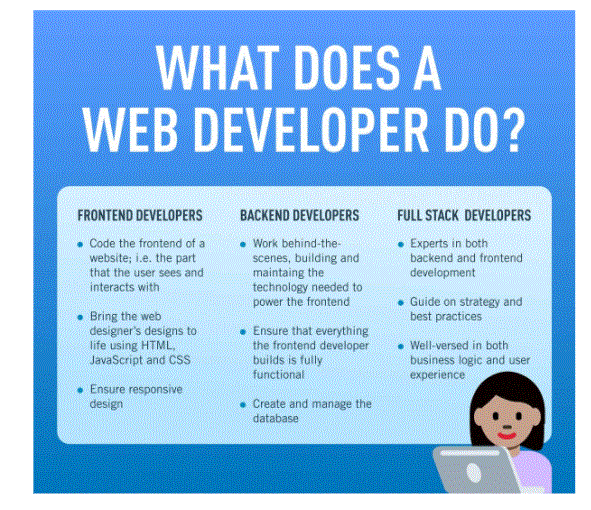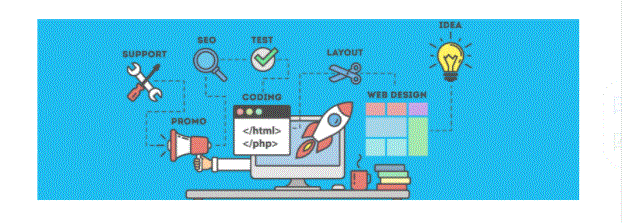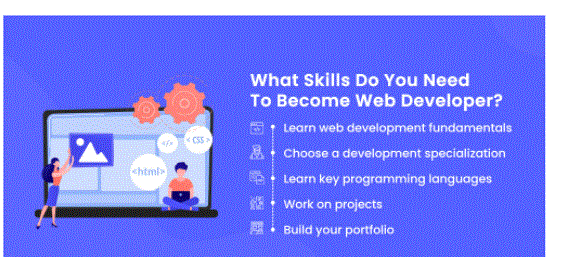
How Do You Become a Web Developer?:
To become a web developer, you must have an understanding of HTML, CSS and JavaScript. It is also recommended to learn about CSS and CSS Frameworks. Developing these foundational web development skills will give you the foundation and logic to communicate with programming languages.

- The best first step to becoming a web developer is to start learning the fundamentals of web development, including an understanding of HTML (Hypertext Markup Language), CSS (Cascading Style Sheets) and JavaScript.
- Many aspiring web developers are now using coding bootcamps to fast-track the learning process. Coding bootcamps thrive because they are short, immersive and focused on results and employability – their goal is to develop job-ready skills as efficiently as possible, making them increasingly worthwhile investments for web developers. According to the job site, the U.S. Four out of five companies in the U.S. have hired graduates from a coding bootcamp.
- In fact, the practical benefits of bootcamp coding are becoming apparent over time. For one thing, the field of web development naturally attracts people from all other fields, many of them making the mid-career transition – people for whom a clear and efficient path to skill expansion is a top priority. In addition, employers increasingly value skills and experience over education, which allows anyone who holds a college degree to prove their abilities on a more equal footing with developers.
- It is important to note that web developers – compared to most other fields – must commit to continuous learning to stay on top of changes in web development and programming languages, tools, and trends. This makes it necessary to retrain mid-career whether or not the line of work you started in.
Learn Web Development Fundamentals:
Choose a Development Specialisation:
As you continue to hone your skills, you will need to choose an area of expertise. But what are the types of web development? All web developers are classified into three main types:
Front end Developer. A front-end developer works on the “client-side” of web development, which means any part of a site or app that users interact with. This may include the site’s layout, design, and the way users interact with it.
Back-end developer. The back-end developer works on the “server-side” of the web development. It focuses on how the site functions and may include databases, servers, networks, and hosting, etc.
Complete stack maker. A full-stack developer is familiar with both front-end and back-end development and works with both sides of a website.

- HTML (Hypertext Markup Language)
- CSS (Cascading Style Sheets)
- Javascript
- Of course, the list goes on – it’s just the beginning. In fact, web development is such a diverse and diverse field that the list of all the tasks involved (and all the coding languages and markup languages you can use to accomplish them) is too long to fit in this space. Fortunately, as an expert, you can find and focus on the ones that work best for you.
Learn Key Programming Languages for Web Development:
Whatever your area of concentration, you need to know how to use a handful of different programming languages for web development and web design. So, which are the most common programming languages?
Three families of programming languages make up the basic tools involved in almost all aspects of web development:
Build Projects to Develop Your Web Developer Skills:
With the basics in HTML, CSS, and JavaScript, and a foundation of programming skills, you’re ready to start building. As you progress, you will gain experience using an ever-increasing set of web developer skills. Some of these are technical skills, or “hard” skills, such as programming in SQL or Python, using the jQuery library for more efficient programming, or using tools like for version control. The best way to improve these web development skills is to just start messing around – the more you use them, the better you’ll be.
There are also a number of web design skills that are useful to web developers, with the understanding that responsive design is perhaps the most important. While web developers are not usually tasked with overall site design, it is also a benefit for developers to have a solid understanding of general design principles. Front-end developers, in particular, program the screens with which users interact – and they can be far more successful with a good understanding of user-centred design.

- An attractive web developer portfolio showing off your strongest skills is your best tool when applying for a web development job. There are three things to keep in mind while creating a portfolio that stands out from the pack.
- First, your web developer portfolio should include a diverse selection of web development jobs. You don’t want to use up every project you’ve ever worked on – your professional portfolio should be a highlight reel that not only showcases your best work, but your versatility. You want to be selective and highlight your best work, but your selection should be diverse enough to demonstrate a solid understanding of the different elements of the position. When applying for web developer jobs, do a little research about the company and the role you want to fill – then refine your portfolio even further, editing out unrelated examples and spotlighting your most relevant work.
- Second, think about what makes you and your job special. Emphasise the web development skills that make you stand out – not only in the work you incorporate into your portfolio, but in how the portfolio is presented. For example, if you are applying for design-related roles, your portfolio website should have a solid front end – a great user experience with a beautiful interface. And if you are applying for the web developer role, make sure your portfolio is displayed on a flawless site. This means there is no messy code.
- Third, show your process. Employers are not only looking at the quality of the work you produce, but also how you approach problems. Don’t be afraid to frame each example as a case study, providing a description of your thought process and the problem you were trying to solve with the project. Showing background on how your projects were built will help recruiters and hiring managers understand your work, and will say nothing more than just a standalone piece. It’s also a great opportunity to showcase your communication skills – an important part of excelling in a position.
Build a Web Development Portfolio:
Is Web Development a Growing Field?:
Yes, the web development sector is booming. There are over 1.3 million developer jobs available in North America, and more than 47,000 new development jobs were created in the past two years, with the market expected to grow an additional 15% over the next 5 years. For these reasons, Mondo found “web developer” to be the most sought-after job title in tech and one of its top-paying jobs.
What is the salary of a web developer?
According to the job site, the average salary of web developers in the United States is $71,531, senior web developers average $95,325. This makes web development one of the most lucrative positions that does not require any degree.
How do I become a web developer faster?
Coding bootcamps have become an increasingly popular option for aspiring web developers because they provide a hands-on learning experience and the chance to develop job-ready skills – in as little as 12 weeks.
Traditionally, many web developers started out with higher education in software engineering, computer science, or related fields. However, it is also possible to come from an entirely different industry. In fact, an increasing number of professionals are making the move later in their careers to either be self-taught or to pursue a diploma with a coding bootcamp. In fact, Brainstation’s digital skills survey found that 55 percent of growth respondents started their careers in a different field and 58 percent had been programming for only five years or less.

What Is Needed to Become a Web Developer:
Here are some things you will need to learn to become a web developer:
Foundations: To become a web developer, you must develop a comprehensive understanding of how the web works. It will deepen your HTML and CSS knowledge to create and style more advanced static web pages using a framework like Flexbox. It will also help you establish problem-solving practises and reasoning to understand advanced programming concepts.
Programming Basics: Basic knowledge of JavaScript and object-oriented programming should be a starting point for web developers, as it will improve your ability to write and build components.
Front-end Framework: It is important for aspiring web developers to learn how to use React, a JavaScript framework, to build complex and dynamic web pages and professional-level user interfaces.
Web Server: To become a web developer, you need to know how to build a server using modern back-end frameworks and how to develop custom APIs and serve static websites and files.
Server-Side Programming: It is important for web developers to have an understanding of server-side rendering and templating engines, which are used to create blank page templates filled with dynamic data, such as a series of product pages for an eCommerce store.
Databases: Aspiring web developers need to understand the core concepts surrounding data and learn how to manage databases and data on a web server.
As in other technical fields, it is important for web developers to network and keep learning, as programming languages and technologies change frequently. In addition to bootcamps, web development courses, panel discussions, and coding workshops, you can also stay current by contributing to an open-source commons, such as GitHub or Bootstrap. And of course, to become a web developer, you will need a portfolio of completed projects for your job search. Regardless of your specific interests, it is important to demonstrate your versatility to give clients from different industries a sense of your capabilities.
- Web developers are at the forefront of the Internet age. The websites we browse, the gifts we order and the news we see online are all made possible by the web developers who design, build and implement internet websites. They are heavily involved in website building, with the help of design aesthetic qualities such as layout and colour, to technical considerations such as how to design a website to handle a certain amount of Internet traffic.
- Not only is the web development sector exciting and at the forefront of the digital age, but it is also a growing sector. This guide will explain how to become a web developer, what skills and education are needed, different career paths, current market trends, and what people can expect as a web developer professional.
- Front-end developers (also known as client-side development) use various programming languages and frameworks such as HTML, CSS, and JavaScript to create the external look and features of a site. Back-end developers use programming languages such as Python and Ruby to design, build, and integrate applications from front-end development into the back-end in other words, they operate the features on-site. Individuals with skills in both front- and back-end development are known as “full-stack developers”.
Why Web Developer:
- Time management means managing the hours of the day. It is about planning and organising how much time you will spend completing certain activities, whether professional or personal.
- Effective time management enables you to plan and perform daily tasks within the stipulated time frame. In this way, activities do not accumulate and can be developed with more dedication.
- There are countless time management tools and techniques to help you understand your work routine and develop methodologies that you can use to optimise every minute of the day. Fortunately, it is now possible to have technology as an ally in the time management process.
Conclusion:





